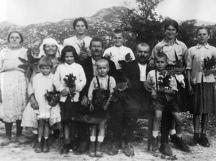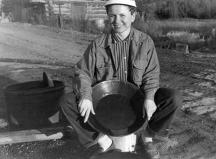| Distributed by CroatianWorld
Croatians in Alaska  
Golden days in Flat
MARY MISCOVICH
Interview by SHARON BUSHELL
(Published: November 9, 2003)
I was born in Yugoslavia, now known as Croatia, in a small town about four miles from the Adriatic Sea. It had a population of about 200 and was truly a one-horse village. If you wanted to call your neighbor, you yelled from your house, "Hey!"
My childhood was good but also sad, as I was a young child when war began in the late '30s. My mother died during childbirth, and there were six of us left. It was particularly difficult for several years when the war was going on. Though the war ended in 1945, it was pretty tough times in Yugoslavia until 1950; that's when things started to get better.
Before the war, people had everything. If you had money, you could go to town and buy whatever you needed. In '39, when the Germans took over Poland, then it became more and more difficult to find things in the stores. If you didn't have a farm or a garden, you went hungry. Lots of people starved, especially children.
My father was a very good provider. He was a farmer, and he also raised bees. The honey was sold to get rice and flour. We always had a cow for milk, and we also had some sheep, so it was fairly easy for us to survive. The people in the city who lost their jobs and had no connections for a place to live were the ones who suffered. There was nothing to buy even if you had lots of money. By then there was war all over Europe, including Yugoslavia.
For those of us who were young, living in villages, I think I would have to say, however, that people kept their spirits up. They found ways to be happy. We didn't have much of anything. I had one pair of shoes for school and one outfit to wear to church on Sunday. I never had a bike or any toys.
But we made our own toys and we had fun. We would get together at friends' homes in the evenings and sing. There was no radio or record player. If you wanted to dance, someone would pull out an accordion. You can't stop young people from having fun. Many times the dinner was not good, but when the music starts, who thinks about eating dinner? You dance and have fun even if you don't have a good pair of shoes.
When the Germans came to our village, they took over our school to use for a first-aid station. For two years we studied in private homes.
It was very scary when the German soldiers would come around to your home to check on you. We didn't speak any German, and they didn't speak any Yugoslav. They were suspicious that we were hiding partisans. Our dad would always tell us that we didn't have to worry because we weren't hiding anyone. They would check our home upstairs and downstairs, talking all the time, and we didn't know what they were saying.
We were lucky. They never bothered us like lots of other places, where they were killing people. I think one reason was because for maybe 175 or 200 miles, our area was all Catholic.
One Sunday we went to church to discover that the German soldiers had taken over part of it for their barracks. It was so shocking how they could just take anything they wanted.
They rode huge horses -- I had never seen such big horses -- and they were all black. We didn't have any roads, so they used the horses to go from village to village. There are many images from my childhood there are still scary to think of. Big German shepherd dogs -- that's a hard one for me.
All the young people from ages 16 to 20 did volunteer work on the roads and bridges for three months without pay. My sisters and brothers and I all worked on the rebuilding for three months each, although at separate times.
I was a teenager when my Uncle Pete visited us from Los Angeles. By then the war was over, and I began thinking of going to the United States to live with him. And that's what I did. In 1954 I came to America, where I had an aunt and two uncles living in Los Angeles.
In some ways it was difficult to adapt to living in such a huge city. But in the area where we all lived, most of the people were from Croatia. Everybody spoke Croatian, and they had their own church and market. Sometimes you could almost think you were back in the old country.
At first, when I wrote letters home to my family, it was very hard to tell them what it was like over here; I remember being astonished that there were so many cars. At that time in Yugoslavia, you would see maybe a truck here and a car there.
Through Uncle Pete, I met a very interesting and charming Alaskan man, John Miscovich. We dated for a couple of years and married in 1957.
My uncle and aunt had known John's father and mother many years earlier. I knew about John's family because his cousin back in the old country married my cousin. In the meantime my older sister married John's first cousin over there, so already we had family connections. His father had even come from the same little town that I came from.
My uncle and aunt were concerned about me going to Alaska, but I told them, "Even if John takes me up to the mountains where there is nothing, with him I can survive."
We flew up to Fairbanks and then on to Poorman. Maurey Smith, who worked for the Fairbanks newspaper, met us at the airport to take a picture. I think there was a lot of speculation about the four Miscovich brothers, when they were going to get married. They were all getting pretty old. John was the first to marry, then Andy, then George and Art.
My husband was and still is a miner. After we were married, we went to live in Poorman, which is 60 miles south of Ruby. For some reason I thought it was going to be a pretty good-sized little village. But there was no one there except a very nice lady who cooked, myself and eight men working for the Miscovich brothers -- John and George. But I was young and adventurous, and the five months I spent there was a very happy time in my life.
My first year there I raised flowers and picked berries with the cook and saw the biggest moose I've ever seen. I also saw my first black bear. For the Fourth of July, we went to Flat, which really was a town -- compared to Poorman -- to visit John's sister Ann and her family.
I spent two summers in Poorman. Then we moved to Flat in '59 and have been there every summer since. It's our home; all four of our children think of it as their first and most special home.
Our children were born in fairly quick succession. Three of them were born in Seattle at the Swedish Hospital, and the youngest was born in Orange, California. When we came up each spring, people would wonder how in the world we could take those babies up to a place like Flat, Alaska, where there was no doctor. But we had very healthy children, and they thrived in Alaska.
Every year we came up as a family to work in the mine and grow a big garden and enjoy the beauty and serenity of Alaska. Until recently, all our children came up each summer. Now everyone's lives are so busy.
John and I spend our time back and forth between California and Alaska. Each May, we're chomping at the bit to come back up to Alaska. I love late spring and summer up north, the beauty and seclusion.
For the last 46 years, Flat has been a ghost town; only John and I live there. Actually, we live two miles from Flat in our mining camp near the Discovery claim, where John was born in 1918 and raised.
We're busy every day. We take care of the garden and cut quite a bit of wood. I help John; we've been doing it all these years. We do lots of repair work around the camp and painting, and before you know it, autumn has come. We hope we can make Flat our home for many more years because John loves Alaska, especially this area. It's his home. And I feel that now it is my home too.
Sharon Bushell lives and writes in Homer. Her books, "We Alaskans" and "We Alaskans II," feature her stories about Alaska pioneers that have appeared in the Daily News. For more information, visit her Web site atwww.wealaskans.com.
http://www.adn.com/life/story/4359500p-4367571c.html
|